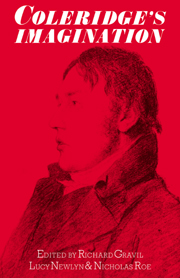Book contents
- Frontmatter
- Contents
- Pete Laver: a memoir
- Abbreviations
- Introduction
- Romantic imagination, nature and the pastoral ideal
- ‘The infinite I AM’: Coleridge and the Ascent of being
- Struggling with the contingent: self-conscious imagination in Coleridge's notebooks
- Coleridge's rejection of nature and the natural man
- The imagination of Mrs Samuel Taylor Coleridge: unknown inspiration of an unknown tongue
- ‘As much diversity as the heart that trembles’: Coleridge's notes on the lakeland fells
- ‘Leaping and lingering’: Coleridge's lyrical ballads
- ‘Radical Difference’: Coleridge and Wordsworth, 1802
- Imagining Wordsworth: 1797–1807–1817
- The Otway connection
- Imagining Robespierre
- Coleridge's Dejection: imagination, joy and the power of love
- Imagining naming shaping: stanza VI of Dejection: an Ode
- Mythopoesis: the unity of Christabel
- The languages of Kubla Khan
- Notes on the contributors
- Index
Introduction
Published online by Cambridge University Press: 04 August 2010
- Frontmatter
- Contents
- Pete Laver: a memoir
- Abbreviations
- Introduction
- Romantic imagination, nature and the pastoral ideal
- ‘The infinite I AM’: Coleridge and the Ascent of being
- Struggling with the contingent: self-conscious imagination in Coleridge's notebooks
- Coleridge's rejection of nature and the natural man
- The imagination of Mrs Samuel Taylor Coleridge: unknown inspiration of an unknown tongue
- ‘As much diversity as the heart that trembles’: Coleridge's notes on the lakeland fells
- ‘Leaping and lingering’: Coleridge's lyrical ballads
- ‘Radical Difference’: Coleridge and Wordsworth, 1802
- Imagining Wordsworth: 1797–1807–1817
- The Otway connection
- Imagining Robespierre
- Coleridge's Dejection: imagination, joy and the power of love
- Imagining naming shaping: stanza VI of Dejection: an Ode
- Mythopoesis: the unity of Christabel
- The languages of Kubla Khan
- Notes on the contributors
- Index
Summary
Imagination was many things to Coleridge, and the contributors to this book have been as varied in their preoccupations and approaches as the writer himself. Thomas McFarland, in the first and most general of the essays – ‘Romantic imagination, nature and the pastoral ideal’ – is concerned with the origins of Romanticism in the years that followed the French Revolution, and its relation to ‘the vision of a simpler existence’ proffered by pastoral. Distinguishing between ‘solitude of identity’ and ‘solitude of alienation’, he takes as his texts Alastor and This Lime-Tree Bower My Prison. ‘Both solitudes’, he argues, ‘are Romantic in that they arise from the accelerating external pressures on the ego that were determinants of Romanticism’; but only the ‘solitude of identity’ can find a balm in its extension of Theocritan pastoral. Shelley's poet leaves ‘His cold fireside and alienated home/ To seek strange truths in distant lands’, but can find no reconciliation; for the Coleridge of This Lime-Tree Bower; however, ‘imagination's invocation of nature can serve to align Romantic solitude with the essentials of the pastoral ideal’.
Jonathan Wordsworth too is concerned with the finding of identity through an act of imagination. In ‘The infinite I AM’, he examines two persistent and related assumptions: that Coleridge's thinking about imagination in Biographia Literaria derived from German metaphysics; and that, despite his choice of words, Coleridge regarded the primary imagination as of secondary importance.
- Type
- Chapter
- Information
- Coleridge's ImaginationEssays in Memory of Pete Laver, pp. 1 - 4Publisher: Cambridge University PressPrint publication year: 1985



